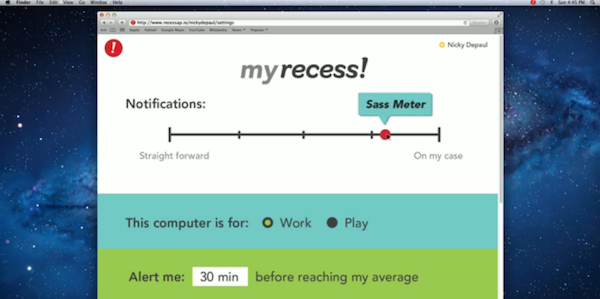Recess Moves From The Playground To The Computer


Ah, recess. Those wonderful breaks in days bygone when we could rest our minds, stretch our legs and return to class with renewed energy, ready to learn. How many times have we longed to once again feel the joy of recess during our long, sometimes dreary work days? One new app hopes to do just that.
The “Recess” app is a productivity tool developed during the “Hacking Energy Culture Hackathon” held by GOOD earlier this month. The app was the winning solution for generating new ways to interface energy consumption, waste and preservation. Developed by Something Dangerous’ Nicholas DePaul, Katrinna Whiting, Kevin Zweerink and Kacie Mills, Recess is designed to help people waste less time when using their computers by tracking computer activity and offering customized notifications and monthly analytics reports showing the cost of wasting time while on the computer.
The app’s goal is to help users manage their computer time efficiently and sustainably. It tracks the amount of time a user’s computer is on and awake, and analysis reports detail the total time spent on the computer each day, week and month, as well as the average energy used and the energy cost. The app sends a desktop notification when the average is reached each day. By making the data visible, developers hope Recess will inspire users to spend less time engaged in “nonessential” activities on computers and spend more time exercising, reading or socializing with friends and family.
To determine the average, Recess tracks the amount of time a user’s computer is on an awake. If a laptop is closed, or a desktop is asleep, the time is excluded from the average. Averages are calculated based on the past 60 days of use. If a change in schedule occurs, Recess will learn the new usage patter and adjust the average accordingly. Energy used during “sleep” periods, however, is still included in the energy cost calculations.
Recess interacts with users via notifications. In the default setting, Recess sends notifications when the daily average has been reached as a gentle reminder. Users can customize notifications, however, choosing what voice they hear based on a “sass meter,” and even write their own personalized notifications, alerting them to take breaks, exercise or even to eat breakfast. Notifications can be turned off manually, disappear after a period of time, or be eliminated completely.
Although Recess is in its early stages of development and is not yet available for use, a beta version should be ready in the next few months. Something Dangerous hopes the app will be implemented on a large scale by academic, governmental and multinational institutions, as well as businesses, to collect information from all the computers on their networks. Account managers, for example, could have computers remind users to shut down at the end of the work day and visually show employees their commitment to preserving energy. Ultimately, Something Dangerous hopes to someday donate money from energy savings to environmental causes that could even be matched by managers or outside donors.
[Image via Recess]









































